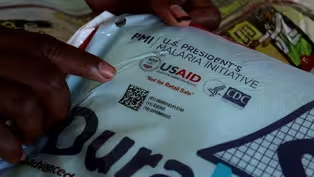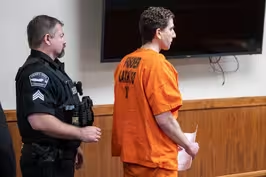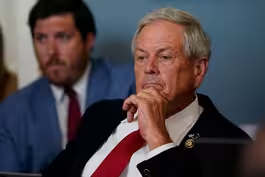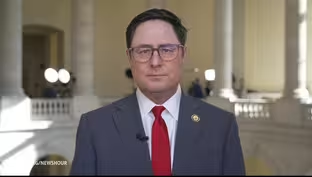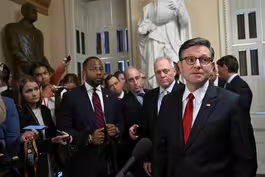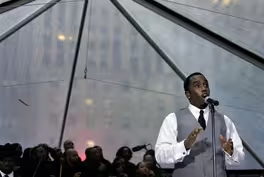
What Paramount's Trump settlement means for press freedom
Clip: 7/2/2025 | 6m 5sVideo has Closed Captions
What Paramount's multi-million dollar settlement with Trump means for press freedom
Paramount agreed to pay Donald Trump $16 million to settle a lawsuit over a “60 Minutes” interview with Kamala Harris. Trump alleged the interview was edited to improve how Harris sounded, a claim CBS denied. Paramount said the funds will go to President Trump’s library, not him personally, and did not have to issue an apology as part of the deal. Amna Nawaz discussed more with Brian Stelter.
Problems playing video? | Closed Captioning Feedback
Problems playing video? | Closed Captioning Feedback
Major corporate funding for the PBS News Hour is provided by BDO, BNSF, Consumer Cellular, American Cruise Lines, and Raymond James. Funding for the PBS NewsHour Weekend is provided by...

What Paramount's Trump settlement means for press freedom
Clip: 7/2/2025 | 6m 5sVideo has Closed Captions
Paramount agreed to pay Donald Trump $16 million to settle a lawsuit over a “60 Minutes” interview with Kamala Harris. Trump alleged the interview was edited to improve how Harris sounded, a claim CBS denied. Paramount said the funds will go to President Trump’s library, not him personally, and did not have to issue an apology as part of the deal. Amna Nawaz discussed more with Brian Stelter.
Problems playing video? | Closed Captioning Feedback
How to Watch PBS News Hour
PBS News Hour is available to stream on pbs.org and the free PBS App, available on iPhone, Apple TV, Android TV, Android smartphones, Amazon Fire TV, Amazon Fire Tablet, Roku, Samsung Smart TV, and Vizio.
Providing Support for PBS.org
Learn Moreabout PBS online sponsorshipAMNA NAWAZ: Paramount has agreed to pay Donald Trump $16 million to settle a lawsuit over a "60 Minutes" interview with his former presidential opponent Kamala Harris.
"60 Minutes" airs on CBS, which Paramount owns.
Mr. Trump alleged that the interview, which aired one month before the 2024 election, was selectively edited to improve how then-Vice President Harris sounded.
CBS denied that.
Today, the head of CBS, George Cheeks, defended the settlement at Paramount's annual shareholder meeting, saying -- quote -- "The settlement offers a negotiated resolution to allow companies to focus on their core objectives, rather than being mired in uncertainty and distraction."
Paramount said the funds will go to President Trump's library, not to him personally.
CBS did not have to issue an apology as part of the deal.
For more on this, I'm joined by Brian Stelter.
He's the chief media analyst for CNN, and he writes the "Reliable Sources" newsletter.
Brian, welcome back to the "News Hour."
BRIAN STELTER, CNN Chief Media Correspondent: Thanks so much.
AMNA NAWAZ: So, Brian, this is not the first major media company to settle with President Trump.
You have been following this, though.
Did anything in this settlement or its terms surprise you?
BRIAN STELTER: Well, CBS did not actually do anything wrong here.
CBS engaged in standard television news editing practices, but its parent company paid the price anyway, with some people likening this to a ransom or even a bribe.
The terms are not surprising because, as you said, Paramount's not the first company to do this.
Disney's ABC in some ways wrote the playbook that Paramount is now relying on, because, last December, when Trump was still president-elect, ABC settled with Trump out of court to the tune of $16 million.
So, here we are again with $16 million heading toward Trump's presidential library.
The big difference in this case is that Paramount is trying to get a merger approved by the Trump administration.
And that is why the word bribe has come up, with Democratic senators wondering if this was a bribe to try to get the Trump administration to approve the deal.
Paramount says no, Trump's FCC says no, but a lot of outside analysts believe that is the case.
AMNA NAWAZ: Brian, I want to underscore this point you're making, that it is standard journalistic practice to edit interviews for length, for clarity, for a number of editorial reasons.
Is it clear that Paramount would have lost this suit if they'd continued to fight?
BRIAN STELTER: To the contrary, Paramount likely would have prevailed.
But Trump filed this lawsuit before winning reelection in a court in Texas that in some ways was very favorable to him.
I have spoken with numerous legal experts who said that CBS had a very strong First Amendment case, but there were ways this could have gone sideways for CBS, given the jurisdiction of the case and given the uncertainty of going up against a presidential litigant.
I mean, this is a very unusual situation.
I know in 2025, this seems normal now, but, up until this year, this is incredibly abnormal to have a sitting president suing a television network, trying to strike a settlement deal, maybe asking for an apology, which CBS refused to provide.
This is a situation where I think we're all getting accustomed to how transactional this president can be.
And now we will see what happens.
Will the Trump administration approve Paramount's deal with Skydance?
Will there be other terms or conditions attached to that merger approval?
That's the great unknown.
AMNA NAWAZ: Well, as the lawsuit was unfolding, and there were reports about mediation between Paramount head Shari Redstone and Trump's team, there were also accusations from CBS journalists that Paramount leadership was meddling in their coverage of President Trump.
We saw longtime "60 Minutes" producer Bill Owens leave under pressure in April.
We saw the head of CBS News, Wendy McMahon, leave in May.
What are you hearing from inside CBS News, from inside "60 Minutes" about this other news?
BRIAN STELTER: A mixture of outrage and anger about the settlement, but also a sense of resignation because this was in the works for months.
Some people thought the dollar amount would actually be higher than it ultimately was, and also among some staffers today a sense of relief that this chapter is over.
Yes, corporate priorities trumped journalistic principles in this case.
But for all the criticism of Paramount and boss Shari Redstone, "60 Minutes" did broadcast all the stories it wanted to broadcast last spring.
You know, the stories were not cut.
So what we are seeing is this tug-of-war that's taking place.
The journalists at CBS wanted their company to fight, to defend them, to go to court if they had to, in order to defend the reputation of CBS.
The parent company decided to fold by settling.
AMNA NAWAZ: So, Brian, what's the bigger impact here?
I mean, I want to put to you part of a statement from Jodie Ginsberg, who's the head of the Committee to Protect Journalists.
She said CBS caved to groundless threats here.
She also said that this signals that: "The current administration, as well as any future administrations, can interfere with or influence editorial decisions."
You had ABC News settle.
You have now had CBS settle.
Is there a larger concern about press freedom here?
BRIAN STELTER: There is, because the public needs and wants independent impartial journalism.
And for the most part, that's what Americans are getting.
Despite all of Trump's threats, despite his lawsuits and despite his other attempts to crack down on a free press, the news is getting out.
And Americans by and large are still well informed about what's going on with this administration.
But the reason why legal experts I spoke with today and press freedom advocates today have been using words like authoritarianism is because they're worried about the democratic backsliding that this might represent.
If a president can sue a media outlet and tie it up in knots legally in court, if a president can convince a media outlet to pay tens of millions of dollars in settlements in order to avoid a protracted dispute, that is an unsettling path forward for the American news media.
AMNA NAWAZ: Brian Stelter, chief media analyst for CNN and the man behind the "Reliable Sources" newsletter, great to speak with you.
Thank you.
BRIAN STELTER: Thanks.
Ghana struggles to fight disease, poverty without U.S. aid
Video has Closed Captions
Clip: 7/2/2025 | 10m 36s | Ghana struggles to fight disease and poverty without vital U.S. aid (10m 36s)
Iran intensifying crackdown on dissent, Nobel laureate says
Video has Closed Captions
Clip: 7/2/2025 | 6m 5s | Iran is intensifying its crackdown on dissent, Nobel laureate Narges Mohammadi says (6m 5s)
News Wrap: Killer of 4 Idaho students pleads guilty
Video has Closed Captions
Clip: 7/2/2025 | 6m 9s | News Wrap: Killer of 4 Idaho students pleads guilty to murder (6m 9s)
Rep. Norman says Medicaid cut in bill is 'righting a wrong'
Video has Closed Captions
Clip: 7/2/2025 | 7m 56s | GOP Rep. Norman says Medicaid cut in Trump's bill is 'righting a wrong' (7m 56s)
Trump bill will get through this amid objections, Flood says
Video has Closed Captions
Clip: 7/2/2025 | 7m 1s | Rep. Flood says Trump's bill 'will get through this' amid some GOP objections in House (7m 1s)
Where Trump's massive policy bill stands in the House
Video has Closed Captions
Clip: 7/2/2025 | 4m 14s | Where Trump's massive policy bill stands in the House as some Republicans express concerns (4m 14s)
Why the jury returned a mixed verdict in the 'Diddy' trial
Video has Closed Captions
Clip: 7/2/2025 | 4m 40s | Why the jury returned a mixed verdict in the trial of Sean 'Diddy' Combs (4m 40s)
Providing Support for PBS.org
Learn Moreabout PBS online sponsorshipSupport for PBS provided by:
Major corporate funding for the PBS News Hour is provided by BDO, BNSF, Consumer Cellular, American Cruise Lines, and Raymond James. Funding for the PBS NewsHour Weekend is provided by...
